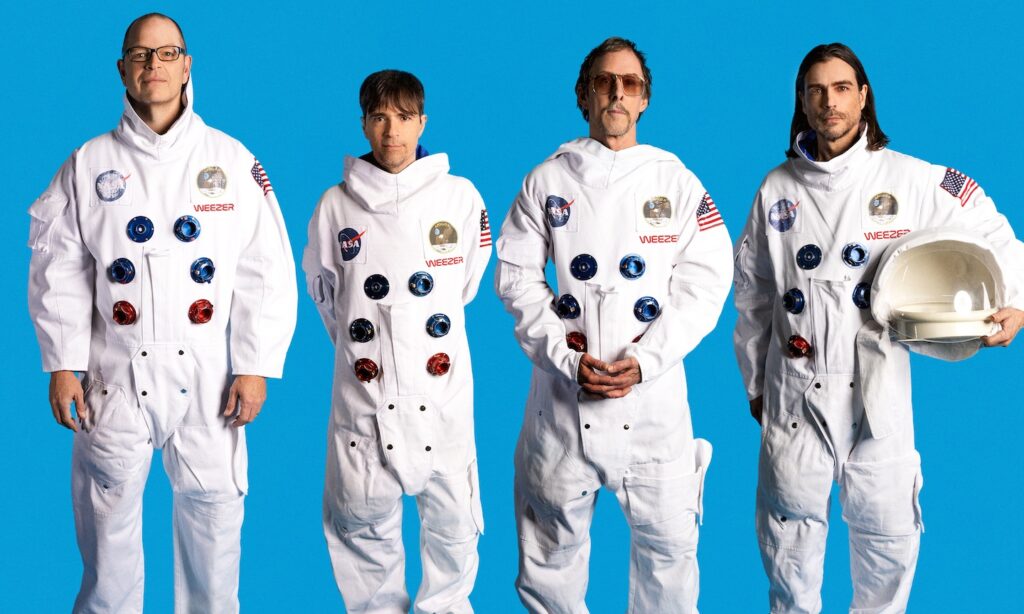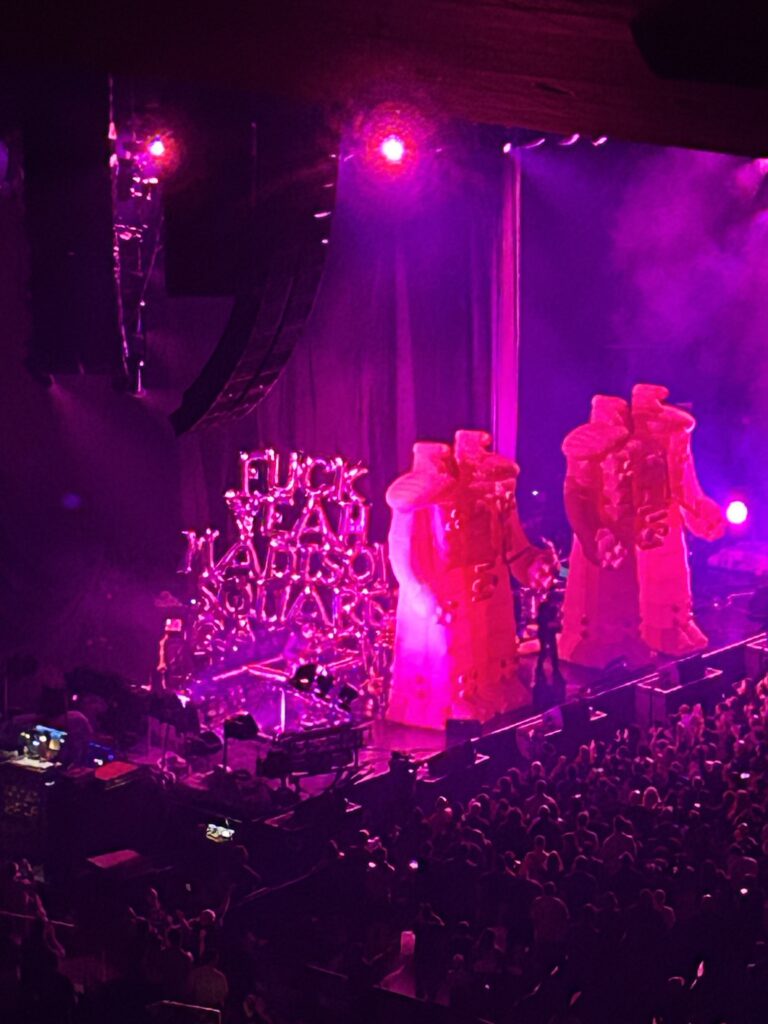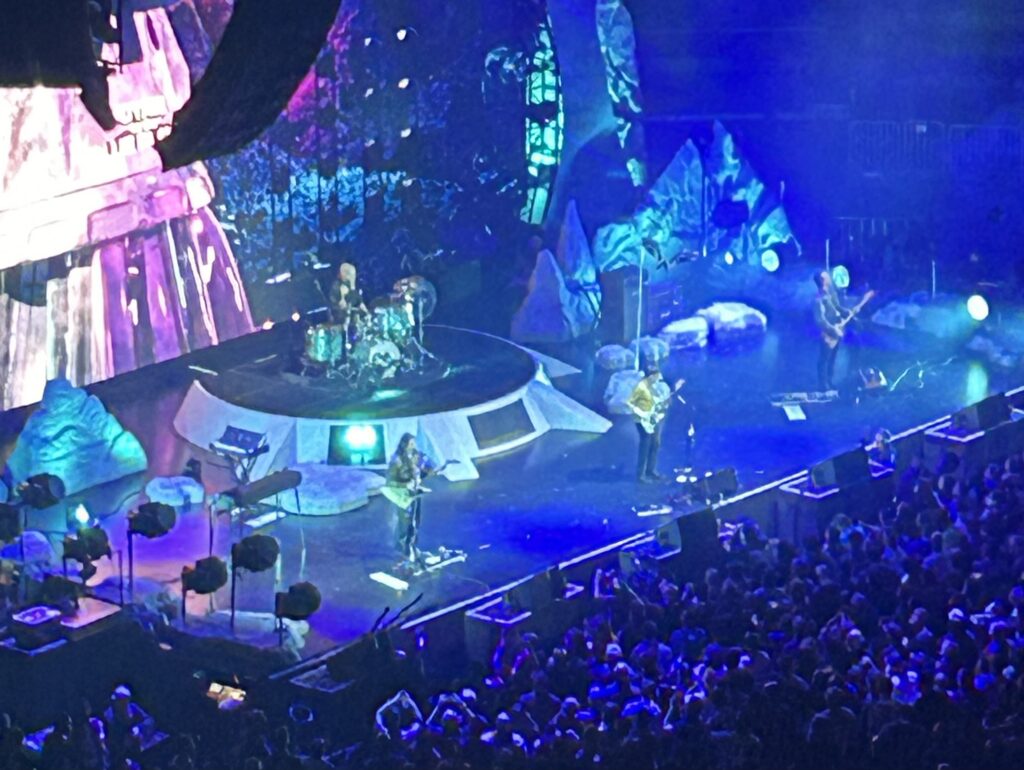
In the immediate aftermath of the September 11, 2001 terrorist attacks, every musical act in America cancelled their concerts for self-explanatory reasons. If I recall correctly, the very first band to resume touring and performing that fateful Fall was Weezer–presumably not out of any sense of defiance or protest or whatever, but simply because the band had bills to pay, and they and their fans needed to get out of their heads for an evening. I wondered if the band might make oblique allusion to that little factoid as I entered New York’s Madison Square Garden on September 11, 2024, to see Weezer launch their Voyage to the Blue Planet tour.
Spoiler alert: they did not reference 9/11, and that was probably for the best. Weezer is very much a walking, talking Peter Pan-syndrome of a band, one trapped in a permanent state of arrested development, no matter how close they get to joining the AARP set; you do not check out latter-day Weezer to see how much they’ve grown or matured, but to make believe with them that you are still young as well, back when all your anxieties were strictly of the adolescent variety. Acknowledging 9/11–whether the original or the anniversary over 20 years later–would preclude that fantasy.
Not that I was terribly interested in that fantasy anymore. I have written before about how, back in high school (right around the turn of the millennium and 9/11 as well, incidentally), I considered myself a die-hard Weezer fan. I had just about memorized their triple-platinum Blue album, and reverenced Pinkerton as perhaps the most brutally-honest assessment of an awkward young man’s libido ever committed to CD. Sure, their comeback Green album and its immediate follow-up Maladroit had been underwhelming, but we convinced ourselves that they were just shaking off the cobwebs and getting their mojo back, and would surely get back into top form in no time.
It wasn’t until I started BYU after my mission that Weezer finally dropped their fifth album Make Believe in 2005, which was when my long-suffering fandom finally reached its limit. Oh I tried, I sincerely tried, to like it for old time’s sake! I tried to read “Beverly Hills” as some sort of cheekily-subversive parody of our celebrity-worshiping culture, rather than a dispiritingly-obvious symptom of it; I tried to sing-along to “Perfect Situation” without cringing; I tried to treat “We Are All On Drugs” as an intentional joke. All for naught! Here at last I could make no more excuses for them, the last of my ’90s-era goodwill was officially burned away, I was forced to confess: these songs were just plain awful. They had shifted from singing as teenagers to singing as though they were teenagers, and the difference was immense and catastrophic. Their Peter Pan-syndrome and abject refusal to grow up had finally become a fatal liability.
Indeed, as I explained to a friend who came with me that night, part of why I had never bothered to see Weezer live all these years was that I simply didn’t want to pay money to sit through “Beverly Hills” and all their other post-Y2K dreck, on the off-chance I might hear a couple tracks off Blue or Pinkerton. No, Weezer and I had broken up in college, and we were never, ever getting back together. They were now just someone I used to know.
But as you get older, the siren call of nostalgia gets harder and harder to ignore, and the temptation to relive your youth, if only for an evening, becomes more and more seductive; hence, when Weezer announced that they would be playing the entirety of the the Blue album on its 30th anniversary, I decided it was high-time I pay my respects to not only my once-favorite-band but also my own dearly-departed youth, so I shelled out for a pair of tickets from those extortionists at Ticketmaster.
Fortunately the opening acts alone were almost worth the price of admission—indeed, they seemed almost too big to be mere opening acts themselves. Alt-Rock legends Dinosaur Jr. ripped through the hits in their 30-minute opening set, as J. Mascis stood their stolidly like the old, stoner hippie he’s always been, all while absolutely shredding one face-melting guitar solo after another. Recently-reunited bassist Lou Barlow, meanwhile, jumped around on stage with more personality than all of Weezer would exhibit later that evening. In a more just world, the reunion of the original Dinosaur Jr. lineup would be headlining MSG themselves. Highlights for me included their peon to friendship “Freak Scene,” their biggest hit “Feel The Pain,” and their Robert Smith-approved cover of “Just Like Heaven.”
Second opener The Flaming Lips had even more personality than both bands combined: Wayne Coyne worked the crowd like a magician for their 50-minute set, he had even non-fans singing along to their earliest hit “She Don’t Use Jelly,” they inflated a pair of 20-foot pink robots on stage for “Yoshimi Battles The Pink Robots” (natch), and of course they saved their biggest hit “Do You Realize??” for the grand finale, which Coyne sang under an inflatable rainbow. No crowd-surfing inside a giant gerbil ball like he became famous for in the 2000s, but I can respect that 1) he might be tired of that gimmick by now, and 2) he’s not gonna risk his personal safety for an opening act. Yet The Lips were also the one opener that clearly had fans present to see them, not the headliner.

Nevertheless, the vast majority of attendees at MSG that night were there for one reason and one reason only: to see Weezer perform the Blue album in its entirety. The original CD clocks in at a quite reasonable 41 minutes, so I thought there was a decent chance that Weezer might respect the fact that most of their fans are now pushing middle-age and had work in the morning.
Alas, when Weezer finally took the stage, the opening notes were not the familiar finger-picking of “My Name Is Jonas,” but of the “Futurescope trilogy” that closes out 2014’s Everything Will Be Alright In The End (the only other time since Make Believe I let myself get fooled into giving a new Weezer album a chance). I whipped out my phone and quickly found their set-list from the night previous, where my worst fears were confirmed: they would be performing a dozen or so songs from the 21st century, followed by a half-dozen Pinkerton tracks, before they finally, finally launched into the Blue album. I would not be getting home at a decent hour after all. My friend busted-up laughing when he saw “Beverly Hills” on the set-list. “Foiled again!” I exclaimed.
(I also had to wonder why, if they were going to include any tracks at all from Everything Will Be Alright In The End, Weezer didn’t go with “Back To The Shack“–ya know, the one where he explicitly sings “Rocking out like it’s ’94.” It would’ve been pandering, yes, but then the whole show was pandering; they might as well have just leaned into it.)
The band had to have known that the whole reason they were selling-out Madison Square Gardens for the first time in years (possibly ever) was because everyone just wanted to hear the ‘90s stuff again. Heck, I remember when they had done a similar Blue-and-Pinkerton-only tour a dozen or so years earlier; as more than one online-rag noted at the time, even Weezer knew no one wants to hear their newer crap. (The reason I didn’t go see them then was because you had to buy a second ticket to hear the Pinkerton-only concert on the same tour, which price-gouging of their oldest fans didn’t sit right with me; that and I was still a broke-ass grad student). This wasn’t a blind spot for the band, they’ve known full well for years what their fans actually want. Yet still they barreled ahead with their 2000s oeuvre, even though avoiding the same was the whole selling point of this tour in the first place.
Hence, I couldn’t help but wonder if Cuomo, as he’s gotten on in years himself and started to worry about his long-term legacy, was here trying to make the case that his post-Y2k output should be treated with the same respect and reverence as his ’90s work. Listen to how awesome “Island In The Sun” sounds at concert-venue decibels, he seemed to say! Hear how similar “Pork and Beans” is to Pinkerton, kinda! Surely “Beverly Hills” is as iconic as “Buddy Holly” by now, right? Aren’t you as moved by “Any Friend of Diane’s” as by the bridge to “Say It Ain’t So”? Isn’t the time I wrote “Hash Pipe” and “Dope Nose” the same day as famous as the time Dolly Parton did the same with “Jolene” and “I Will Always Love You”? Oh, and “Perfect Situation” is just as fun to sing along to as “The Sweater Song”, I swear!
Such all seemed to be his argument, anyways; nevertheless, the moment Weezer launched into “Getchoo” for the Pinkerton portion of the show, the difference in quality between their pre- and post-2000 songs was stark and undeniable. The band didn’t even play the best tracks off Pinkerton (i.e. “El Scorcho,” “The Good Life,” and “Falling For You“); but even the lesser-tracks they did deign to play (why on God’s green earth would you still sing “Across the Sea” in the Year of Our Lord 2024?!) were heads-and-shoulders better than everything that preceded it. It was like switching from margarine to Irish Butter, from black-and-white to technicolor, from analog to HD, from Sunkist to Simply Orange, from Walmart house-brand soda to a real Dr Pepper. If Cuomo was making a case for his latter-day output, he failed; but if his goal in playing these mediocrities was to get me even more pumped up for the actual good stuff, he succeeded masterfully.

And indeed, when the opening power-chords of “My Name Is Jonas” at last rang out through the loud-speakers, the crowd went wild and I with it. In an instant, I was swept right back to my teen years, almost in spite of myself. Was it all just a blatant and commercialized nostalgia trip? Dear reader, I. Did. Not. Care! I gladly succumbed. For once, their Peter Pan syndrome was an asset rather than a liability. For the following 40-odd minutes I belted out, with thousands of my closest friends, every word to an album I’d had memorized since high school, without hypocrisy and without guile.
It was an album I had long ago overplayed and lost all ability to listen to freshly; but for that one night only, I was able to hear it as though it were new again. Suddenly it was like the intervening quarter-century—9/11, the invasions of Iraq and Afghanistan, wars and rumors of wars, global warming, global pandemics, global inflation, global resurgences in white-supremacism, nationalism, and authoritarianism, not to mention jobs and careers, bills, bed-times, student loans, kids to raise, retirement accounts, wrinkles, graying hairs, and a thousand other things major and minor besides—had never happened, for all is as only one day unto God, and time is measured only unto man. Was this a cowardly abnegation of responsibility on my part, or a strategic withdrawal to reflect and recharge, like Christ in the wilderness? Judge not, lest ye be judged.
The band thankfully kept the stage banter to a minimum throughout their 2-hour set; the theme of their multi-media stage-show was literally “Voyage to a Blue Planet,” performing as though they were astronauts traveling to a distant blue planet “30 light years away”, passing through such obstacles as the Pinkerton asteroid belt and such. The “twist” towards the end was when Rivers Cuomo revealed that he was a native of the Blue planet all along. “I’m an alien,” he told the crowd in his performatively-awkward way, “And so are you!”
Though the bit was cheesy, he was inadvertently teaching true doctrine: we are all indeed “strangers and pilgrims” on the earth. If we recurrently feel ourselves unable to reconcile ourselves to the unrelenting horrors and injustices of this world—every terrorist attack, every “ethnic cleansing,” every oppression, repression, mass deportation, hate crime, act of bigotry, ignorance, violence, and/or senseless cruelty—no matter how long we live here, it’s because we accurately intuit that we don’t actually belong here at all. As GK Chesterton, CS Lewis, and even Hugh Nibley have all preached before, we all feel that we belong elsewhere, that we in fact came from elsewhere, somewhere celestial—the same place we’re intended to return to. Indeed, we’re supposed to live as though we were back there already right now: “Surf Wax America‘s” rousing chorus of “You take your car to work, I’ll take my board/And when you’re out of fuel, I’m still float” rings as true today—as a clarion call to reject the vanities of this world and seek for the things of a better—as it did in 1994.
My eyes were closed almost the entire time they tore through the Blue album, truth be told—partly cause I was head-banging so hard; partly cause there frankly wasn’t much to see as the band just stood there stiffly in front of their microphones the whole time; partly cause their space-themed stage-set was kinda cringe; partly cause seeing how old these guys in their 50s now look would kinda break the spell—but also partly cause I didn’t need to see them. For I could hear them, I could feel them, I could experience them, like the Holy Spirit itself, which whispereth through and pierceth all things, and often times it maketh my bones to quake while it maketh manifest—
